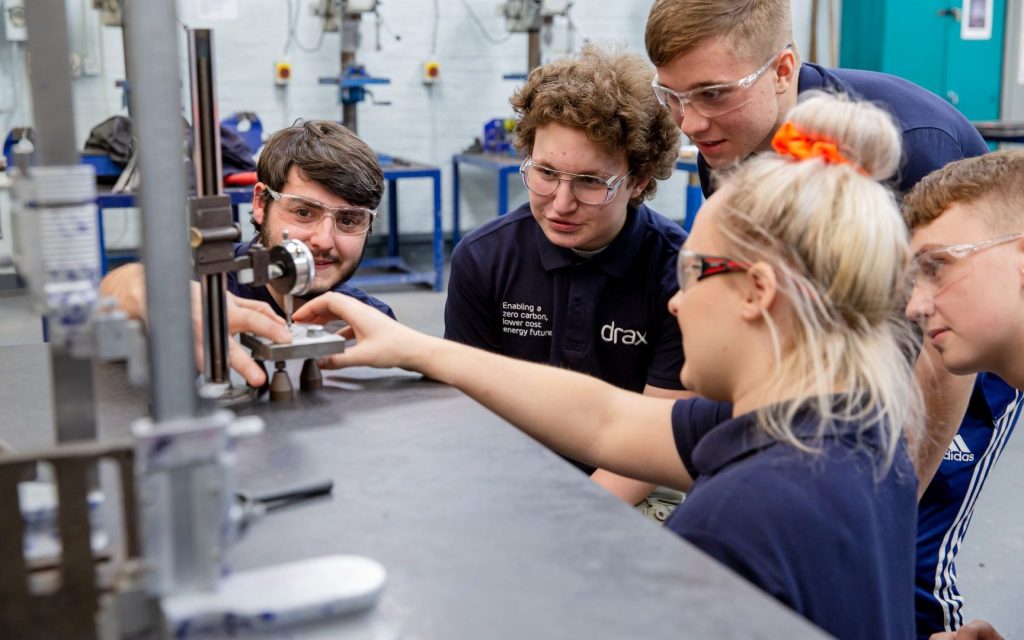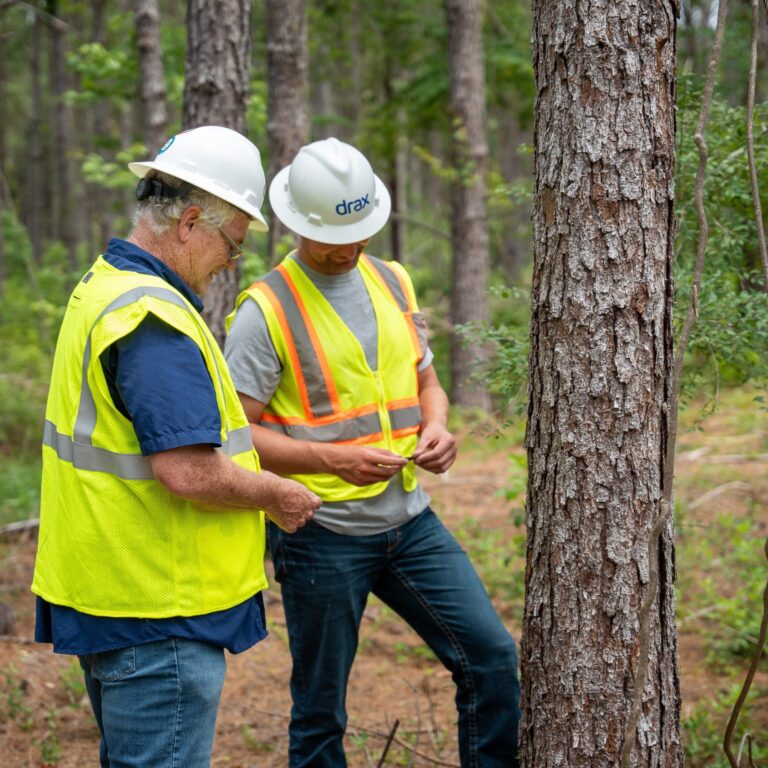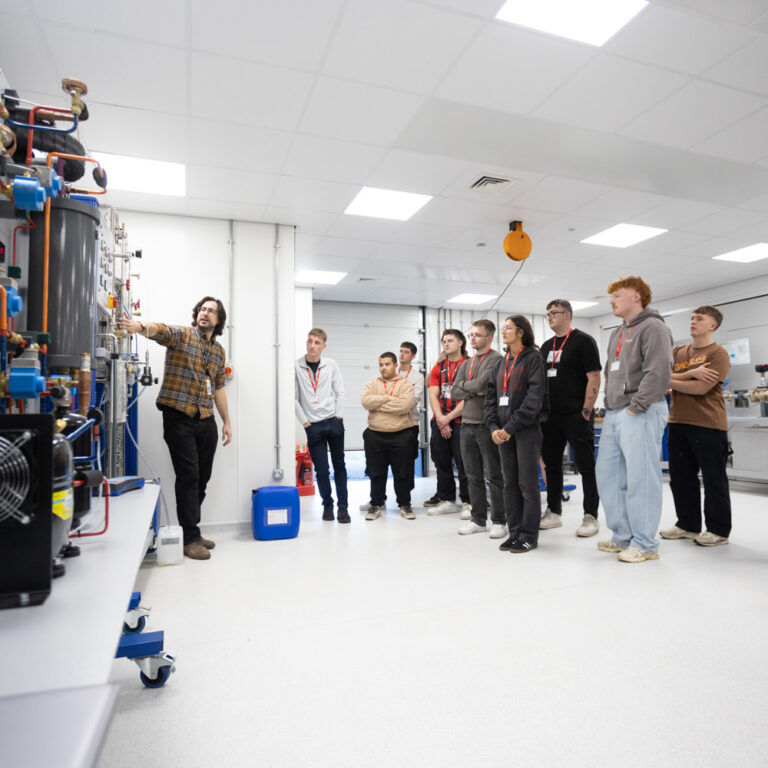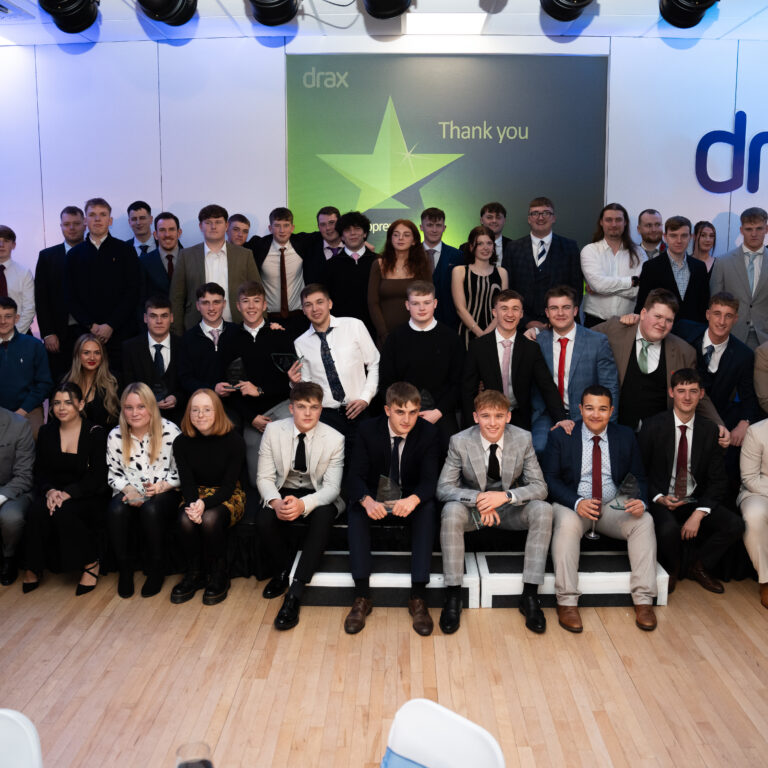Renewable energy company Drax has partnered with businesses local to its operations to help them hire new talent as part of the company’s commitment to supporting education and upskilling.
To help smaller businesses take on apprentices and increase opportunities for young people, Drax has transferred a proportion of its apprenticeship levy to two smaller businesses, construction and equipment company The Bennie Group, based in Northampton, and Hull based EN: Able Futures CIC, which connects young people with apprenticeship opportunities in the construction sector.
Karen McKeever, Drax’s Chief HR Officer, said: “Drax is committed to championing and supporting people in their early careers. Hiring and developing a talented workforce of the future is essential for businesses like ours and we’re pleased to be able to support companies with similar values to us, as well as helping young people in the areas local to our operations to kickstart their careers. We hope this will be a great opportunity for both the company and the apprentices starting out in the industry.”
Matthew Ayres, Group MD of The Bennie Group said: “We are thrilled to have partnered with Drax to deliver two new apprenticeship roles within our equipment solutions business, Bennie Equipment. We would like to thank Drax for their support, which has enabled us to take on additional apprentices and further spread the net of opportunity for these young people.
“We are proud to share the same passion in supporting the next young generation of UK workers in learning a trade, developing practical skills, and kick-starting a career. We are both focused on boosting highly skilled workers across the UK and inspiring the next generation of the UK workforce.”
Keith Holiday, age 19 and Harvey Dobson, age 16 from Hull have started Civil Engineering apprenticeships at Alan Wood & Partners, facilitated by EN: Able Futures as a result of the levy transfer.
Keith said: “My apprenticeship is going really well. At Alan Wood & Partners I’ve been involved in a variety of projects already and I’m learning something new every day. I’ve always been interested in design and I think this apprenticeship will open up a lot of different options for me.”
Julie Deeley, Director of Operations at EN:Able Futures said: “It’s fantastic that Drax has shared its apprenticeship levy with EN:Able Futures, without it Keith and Harvey would not have been able to start their apprenticeships which could have meant them following a completely different career path, one which they may not have enjoyed as much as they are enjoying working at Alan Wood & Partners.
“Nationally the number of apprenticeship starts are falling and EN:Able Futures is working hard to create as many new apprenticeships in construction, housing and civil engineering as possible, helping to generate new career opportunities that help people achieve their aspirations.”
Drax’s long-running apprenticeship scheme is part of its commitment to developing new talent as well as upskilling the workforce across the region. Drax has 52 apprentices as well as 50 existing employees working towards apprenticeship qualifications within the business.
ENDS
Media contacts:
Megan Hopgood
Communications Officer
E: megan.hopgood@drax.com
T: 07936350175
Editor’s notes
Drax has been running an apprenticeship scheme for almost two decades at its eponymous power station in North Yorkshire and in recent years has extended this across the whole business as well as offering internships and graduate schemes as part of its dedication to improving skills and increasing opportunities for young people across the region.
Drax runs a number of other initiatives to support STEM education and skills, including:
- Providing laptops with free internet access to support students with home learning.
- Free virtual tours of Drax’s power stations
- Virtual STEM workshops in schools.
- Virtual work experience
Applications are now open for Drax’s next work experience for students in Y10-Y12 or S4-S6 in Scotland. For more details go to www.drax.com/careers. The closing date is 23rd January 2022.
Drax recently launched a major public consultation at its North Yorkshire power station to advance its plans to deploy the pioneering negative emissions technology, bioenergy with carbon capture and storage (BECCS). If successful, Drax could develop two BECCS units by 2030, capturing and storing at least 8 million tonnes of CO2 a year.
Scaling up BECCS at Drax would support over 10,000 jobs at its peak which is why it is vital that the region’s workforce has the skills needed to implement this green energy technology, enabling the UK to meet its 2050 net zero target whilst generating the renewable electricity the country needs.
About Drax
Drax Group’s purpose is to enable a zero carbon, lower cost energy future and in 2019 announced a world-leading ambition to be carbon negative by 2030, using Bioenergy with Carbon Capture and Storage (BECCS) technology.
Its 3,400 employees operate across three principal areas of activity – electricity generation, electricity sales to business customers and compressed wood pellet production and supply to third parties. For more information visit www.drax.com
Power generation:
Drax owns and operates a portfolio of renewable electricity generation assets in England and Scotland. The assets include the UK’s largest power station, based at Selby, North Yorkshire, which supplies five percent of the country’s electricity needs.
Having converted Drax Power Station to use sustainable biomass instead of coal it has become the UK’s biggest renewable power generator and the largest decarbonisation project in Europe. It is also where Drax is piloting the groundbreaking negative emissions technology BECCS within its CCUS (Carbon Capture Utilisation and Storage) Incubation Area.
Its pumped storage, hydro and energy from waste assets in Scotland include Cruachan Power Station – a flexible pumped storage facility within the hollowed-out mountain Ben Cruachan.
The Group also aims to build on its BECCS innovation at Drax Power Station with a target to deliver 4Mt of negative CO2 emissions each year from new-build BECCS outside of the UK by 2030 and is currently developing models for North American and European markets.
Pellet production and supply:
The Group has 13 operational pellet plants with nameplate capacity of c.4Mt, plus a further two plants currently commissioning and other developments/expansions which will increase this to c.5Mt once complete.
Drax is targeting 8Mt of production capacity by 2030, which will require the development of over 3Mt of new biomass pellet production capacity. The pellets are produced using materials sourced from sustainably managed working forests and are supplied to third party customers in Europe and Asia for the generation of renewable power.
Drax’s pellet mills supply around 30% of the biomass used at its own power station in North Yorkshire, England to generate flexible, renewable power for the UK’s homes and businesses.
Customers:
Drax is the largest supplier of renewable electricity to UK businesses, supplying 100% renewable electricity as standard to more than 370,000 sites through Drax and Opus Energy.
It offers a range of energy-related services including energy optimisation, as well as electric vehicle strategy and management.
To find out more go to the website www.energy.drax.com





















